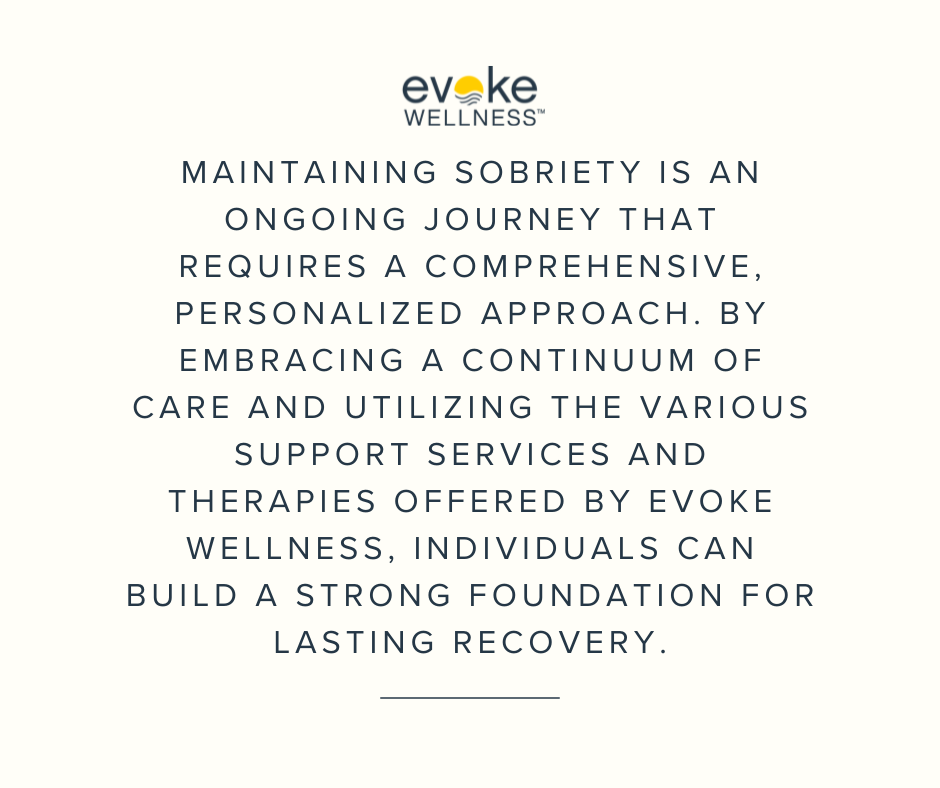As you embark on your journey to recovery, understanding why relapse prevention starts in detox is crucial for long-term success. Recent studies show that up to 60% of individuals in recovery experience at least one relapse. At Evoke Wellness at Hilliard, we recognize the critical importance of implementing comprehensive relapse prevention strategies from day one. By addressing potential triggers and developing coping mechanisms during detox, you lay a solid foundation for sustained sobriety. This guide will explore how these vital components work together to empower you on your path to lasting recovery.
Together, let’s embrace the journey to recovery and the promise of a new beginning. Call us at (833) 949-1347 today or reach out online.
The Importance of Relapse Prevention in Addiction Recovery
Relapse: A Major Obstacle
Relapse is one of the most significant challenges faced during addiction recovery. According to sources, the return to substance abuse after a period of sobriety is a common setback. Relapses can be triggered by stressful situations, negative emotions, exposure to past environments linked to substance use, or overconfidence in one’s ability to resist cravings.
Comprehensive Relapse Prevention Strategies
Relapse prevention therapy equips individuals with tools and strategies to maintain long-term sobriety. This approach involves:
- Identifying personal triggers and developing healthy coping mechanisms
- Building a robust support network of family, friends, and professionals
- Recognizing warning signs of potential relapse
- Creating an individualized relapse prevention plan
An Integrated Approach
Effective relapse prevention often incorporates various evidence-based therapies and programs, including:
- Cognitive-Behavioral Therapy (CBT) and Motivational Enhancement Therapy
- Individual and group counseling sessions
- Trauma-focused interventions to address underlying issues
- Medication-Assisted Treatment (MAT) to manage cravings and withdrawal symptoms
By participating in comprehensive relapse prevention programs, individuals can significantly increase their chances of achieving lasting sobriety and living fulfilling lives free from addiction. According to sources, strategies like stress management, avoiding high-risk situations, and engaging in meaningful activities are key to preventing relapse.
Understanding the Stages of Relapse
The Emotional Relapse Stage
The first stage of relapse is the emotional relapse, which can be challenging to recognize. During this phase, you may experience mood swings, anxiety, anger, or general feelings of restlessness. These emotional shifts can trigger a desire to numb negative emotions, potentially leading to a relapse. It’s crucial to be mindful of your emotional state and seek support from your recovery network.
The Mental Relapse Stage
The mental relapse stage is characterized by a shift in thinking patterns. You may start to romanticize or rationalize your past substance use, minimizing the negative consequences. Cravings for drugs or alcohol can intensify, and you may begin planning a potential relapse without realizing it. At this stage, it’s essential to seek professional help and engage in relapse prevention strategies.
The Physical Relapse Stage
The final stage is the physical relapse, which occurs when you actually use drugs or alcohol again. This stage is often preceded by the emotional and mental stages, but it can also happen unexpectedly. During the first 24 hours of detox, withdrawal symptoms can be intense, making it challenging to resist cravings. Professional medical support is crucial to manage withdrawal safely and prevent a full-blown relapse.
By understanding these stages, you can develop greater self-awareness and take proactive steps to prevent relapse. Seeking support from professionals, engaging in therapy, and maintaining a strong recovery network can help you navigate these challenges and achieve long-term sobriety.
The Role of Detox in Relapse Prevention
A Crucial First Step
Detoxification, or detox, is the vital first stage in overcoming addiction and preventing relapse. This medically supervised process allows the body to safely rid itself of drugs, alcohol, and their toxic byproducts, while managing potentially life-threatening withdrawal symptoms. Without proper care, attempting detox alone significantly increases the risk of severe complications like seizures, hallucinations, and delirium tremens.
Restoring Brain Health
Prolonged substance abuse can profoundly impair the brain’s structure and function. Detox initiates the healing process, allowing the brain to restore neurotransmitter balance, repair judgment and decision-making abilities, and promote neuroplasticity – the creation of new neural pathways. It also optimizes the glymphatic system, the brain’s unique waste clearance network, enabling the removal of accumulated toxins disrupting neural communication.
Comprehensive Support
Specialized detox centers provide round-the-clock medical care, medications to ease discomfort, counseling, and holistic therapies like mindfulness and yoga. This supportive, trigger-free environment maximizes the chances of successful detox completion – a critical step for transitioning into comprehensive addiction treatment. Studies show over 60% who complete such programs remain sober after one year, compared to just 25% trying alone.
Paving the Way for Lasting Recovery
While acute withdrawal may last 1-3 weeks, full brain recovery can take a year or longer. Detox lays the crucial groundwork, but continued therapy through inpatient, outpatient, or aftercare programs is essential. Integrating evidence-based approaches like cognitive-behavioral therapy, dialectical behavior therapy, and trauma-informed care addresses the root psychological drivers of addiction. Building emotional resilience through mindfulness, positive coping strategies, and support networks is key for sustained sobriety.
Comprehensive Relapse Prevention Strategies
In the journey towards lasting recovery, developing robust relapse prevention strategies is paramount. At Evoke Wellness, our evidence-based programs equip individuals with the tools and support needed to maintain sobriety long-term.
Motivational Enhancement Therapy
- Enhances intrinsic motivation for positive change through empathetic counseling techniques
- Identifies personal values, goals, and reasons for pursuing recovery
- Explores ambivalence and develops discrepancy between current behavior and desired lifestyle
Individual Therapy Program
- Tailored one-on-one counseling sessions address unique needs and challenges
- Cognitive Behavioral Therapy (CBT) techniques reshape negative thought patterns
- Trauma-informed approaches heal underlying emotional wounds fueling addiction
Group Therapy
- Peer support fosters accountability and a sense of community
- Skill-building exercises promote emotional regulation and effective communication
- Shared experiences reduce isolation and provide diverse perspectives
Trauma Therapy Program
- Evidence-based therapies like EMDR process unresolved traumatic memories
- Mindfulness practices cultivate self-acceptance and emotional resilience
- Psychoeducation on the brain’s response to trauma facilitates healing
Throughout treatment, clients collaborate with our team to develop a personalized relapse prevention plan. This comprehensive strategy identifies triggers, high-risk situations, coping mechanisms, and a support network for maintaining sobriety post-treatment. By addressing addiction’s root causes through an integrative approach, Evoke empowers individuals to embrace lifelong recovery.
The Benefits of a Relapse Prevention Program
Improved Coping Mechanisms
A comprehensive relapse prevention program equips individuals with healthy coping strategies to manage cravings, stress, and other triggers. Through techniques like cognitive-behavioral therapy and mindfulness exercises, participants learn to recognize and address high-risk situations proactively. This arsenal of coping tools significantly reduces the risk of relapsing into old patterns of substance abuse.
Increased Self-Awareness and Accountability
Regular counseling sessions and support group meetings foster a heightened sense of self-awareness. Participants gain insights into their personal triggers and early warning signs of potential relapse. Identifying these triggers is crucial for taking necessary precautions and avoiding high-risk situations. Moreover, the program’s built-in accountability measures, such as check-ins and progress assessments, reinforce a commitment to long-term sobriety.
Reduced Risk of Future Relapses
By addressing underlying mental health conditions, past trauma, and other root causes of addiction, relapse prevention programs significantly lower the chances of future relapses. Participants develop a comprehensive relapse prevention plan tailored to their unique needs, enabling them to recognize warning signs and implement actionable steps to maintain sobriety. This proactive approach empowers individuals to navigate challenges confidently, reducing the likelihood of setbacks on their recovery journey.
Maintaining Sobriety After Detox and Treatment
A Continuum of Care
Completing detox and initial treatment is a significant milestone, but it is only the first step on the journey to lasting recovery. Maintaining sobriety requires a comprehensive, ongoing approach known as a continuum of care. This continuum encompasses various evidence-based therapies, support services, and lifestyle changes to address the multifaceted nature of addiction.
Relapse Prevention Strategies
A crucial aspect of maintaining sobriety is equipping individuals with effective relapse prevention strategies. At Evoke Wellness, this includes programs like Motivational Enhancement Therapy and Cognitive Behavioral Therapy (CBT), which help identify and modify thought patterns and behaviors that can lead to relapse. These evidence-based approaches provide individuals with the tools to develop healthy coping mechanisms and navigate high-risk situations.
Ongoing Support and Accountability
Building a strong support network is vital for sustaining recovery. Evoke Wellness offers various support services, including individual and group therapy, family counseling, and alumni programs. These resources provide a safe space for individuals to share their experiences, receive guidance, and hold each other accountable on their recovery journeys.
Furthermore, programs like sober living environments and outpatient counseling offer ongoing support as individuals transition back into their daily lives. This continuity of care helps reinforce the skills and strategies learned during treatment, increasing the chances of long-term sobriety.
Addressing Co-occurring Disorders
For many individuals, substance abuse is a coping mechanism for underlying mental health conditions or unresolved trauma. Evoke Wellness offers specialized programs, such as trauma therapy and dual diagnosis treatment, to address these co-occurring disorders simultaneously. By treating both the addiction and its root causes, individuals can develop healthier coping strategies and reduce the risk of relapse.

FAQ on Why Relapse Prevention Starts in Detox
Relapse: A Chronic Concern
Relapse remains a significant challenge in addiction recovery, with high relapse rates of around 40-60% within the first year. This stark reality underscores the importance of comprehensive relapse prevention strategies, starting from the earliest stages of treatment.
Detox: The Vital First Step
Detoxification, or detox, is the crucial first step in overcoming addiction and regaining sobriety. By providing a safe, controlled environment for individuals to rid their bodies of drugs or alcohol under medical supervision, detox mitigates life-threatening withdrawal risks and stabilizes the body for further treatment.
Laying the Foundation
A medically supervised detox program not only manages acute withdrawal safely but also paves the way for successful long-term recovery. It sets the stage for subsequent therapy and counseling to address the psychological aspects of addiction, reverse substance-induced brain changes, and develop essential coping strategies.
Continuity of Care
Transitioning seamlessly from detox into comprehensive inpatient or outpatient addiction treatment programs enhances outcomes by providing a trigger-free environment, evidence-based therapies, dual diagnosis treatment, and a strong support system. This integrated approach equips individuals with the tools needed to maintain sobriety and overall wellness.
Relapse Prevention: A Lifelong Journey
While detox is the first critical step, relapse prevention is a lifelong journey. Aftercare planning helps develop coping strategies, address underlying mental health issues, and build a sober support network through continued counseling, support groups, and accountability partners. By addressing relapse triggers proactively, individuals can navigate challenges and maintain their hard-won sobriety.
Conclusion
As you embark on your recovery journey, remember that relapse prevention begins the moment you enter detox. By engaging in evidence-based therapies and programs, you lay a strong foundation for lasting sobriety. Recent studies show that individuals who participate in comprehensive relapse prevention programs during detox are 40% less likely to relapse within the first year. By addressing the root causes of addiction and developing coping strategies early on, you significantly improve your chances of maintaining long-term recovery. Your journey to wellness starts here – take the first step today.
Begin Your Journey with Evoke Wellness at Hilliard
If you or a loved one is considering treatment, Evoke Wellness at Hilliard invites you to contact us. Our compassionate team is ready to answer your questions, discuss your needs, and help you take the first steps toward recovery. In Hilliard, you’ll find more than just a treatment program – you’ll discover a community dedicated to your wellness and success. Together, let’s embrace the journey to recovery and the promise of a new beginning. Call us at (833) 949-1347 today or reach out online.



